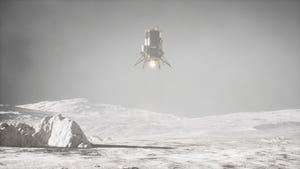LightSquared gains deadline extension as GPS interference evidence mounts
US-based LTE wholesale carrier LightSquared has been granted a two week extension on its deadline to file a report on whether it is able to build out its network without interfering with GPS signals.
June 17, 2011

US-based LTE wholesale carrier LightSquared has been granted a two week extension on its deadline to file a report on whether it is able to build out its network without interfering with GPS signals.
Tests conducted by the National PNT Engineering Forum last week found that the LightSquared network did affect GPS receivers, backing up earlier tests conducted by construction company Deere & Co, which achieved similar results.
US regulator the FCC gave LightSquared the go ahead In January to build its LTE network as long as it could prove that its would not affect GPS signals, which run at frequencies very close to that of LightSquared’s spectrum.
LightSquared’s own report on the issue was due on 15 June, but at the last minute LightSquared requested an extension that was granted. The new deadline is 1 July. Explaining the request, LightSquared’s Jim Carlisle said that, “Based on preliminary test results, LightSquared determined that additional testing, beyond what had been planned initially, including alternative frequency plans to support its network roll-out, was necessary to permit a proper evaluation of various mitigation options for addressing the GPS receiver overload issue.
“Producing a final report is a massive undertaking. The test development, device selection, laboratory set-up, data compilation, analysis, and drafting that are preconditions to a final report require coordination among numerous parties (most of which have detailed numerous representatives to the working group), including LightSquared, GPS device manufacturers, and federal agencies.”
The following day, Jim Kirkland, coalition co-founder and vice president and general counsel of GPS manufacturer Trimble, told a press conference that “the FCC should let the private industry return to work and stop squandering resources to solve an unsolvable problem.”
Meanwhile, a report filed by the National Space-Based Positioning, Navigation and Time Systems Engineering Forum, a US government-led engineering advisory group, suggested that the interference was so bad that it could cause GPS signal degradation at distances “of a few kilometers extending to space operations.”
In the report solutions to the problem “were identified and evaluated but were deemed impractical,” as they would require major changes to equipment would could take between 10 and 15 years.
LightSquared and Sprint have been in discussions on a network share deal that would see the former pay Sprint US$20bn for access to its network.
The fourth annual LTE North America Conference, will take place in Texas, US, November 8-9, 2011
About the Author
You May Also Like










.png?width=300&auto=webp&quality=80&disable=upscale)


_1.jpg?width=300&auto=webp&quality=80&disable=upscale)